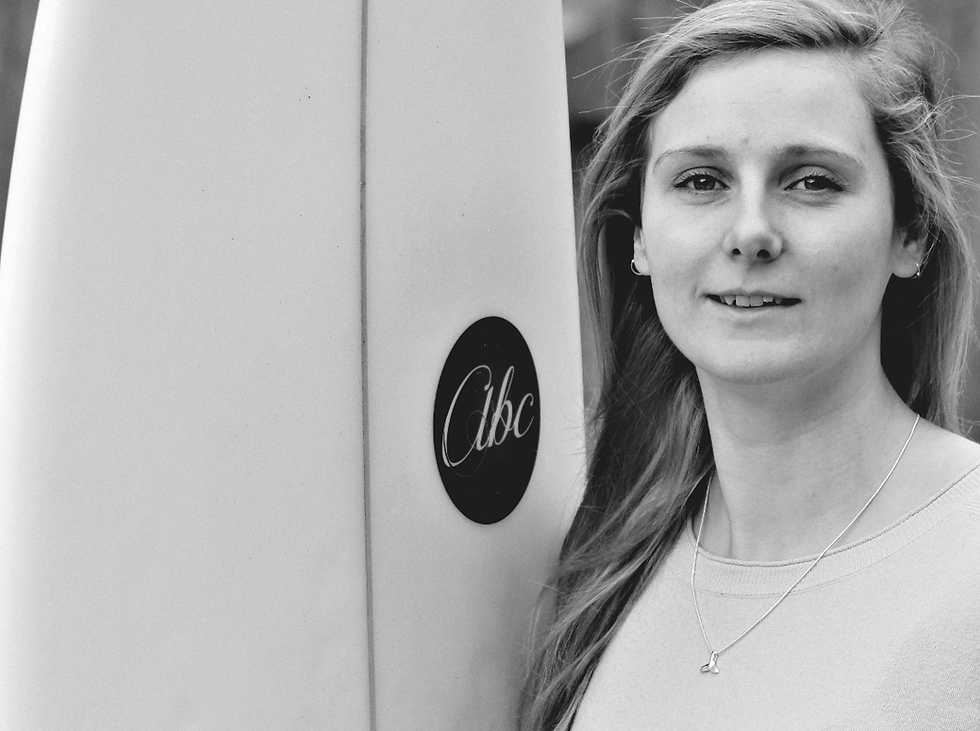Accidental treasures
- LEVEN MEDIA GROUP LTD
- Jan 18, 2021
- 4 min read
Words by Lucy Cornes
A Falmouth-based jewellery designer is repurposing marine litter in a bid to spark conversations about the plight of our oceans.

All images courtesy of Yemaya Collections
To go from marine biologist to jewellery designer might seem an unusual career trajectory, but for Amelia Frances it has been an orchestrated and fulfilling progression. The Falmouth-based conservationist has found a creative outlet for her love of the sea, and a novel way of spreading the message about the urgent need for a global ocean clean-up.

Amelia Frances
Amelia has always had a deep affinity with the ocean, something which manifests itself in every part of her life. From teaching marine conservation and tagging turtles in the Caribbean, to windsurfing around Europe and exploring the wild and rugged shorelines of northern Scotland, Amelia’s global coastal adventures eventually brought her to settle in Cornwall, where she now combines her love of coastal living with running a blossoming creative enterprise.
That enterprise is Yemaya Collections. ‘Yemaya’ comes from the name of a West African water spirit, who became the symbolic protector of all living oceans and rivers according to cultures as geographically distant as Nigeria, Cuba and Brazil. Founded just 18 months ago, Yemaya Collections has gone from being a tiny operation to one which ‘pops up’ in John Lewis stores and features in prestigious international gift guides.
Despite the distractions of running a successful business, Amelia can often be spotted scouring the seashore around her home on the south Cornish coast. She is searching for sea glass, small fragments of tumbled glass which wash up on our beaches, just as it does all around the world. Amelia uses these accidental treasures in her jewellery range, designing rings, bracelets and necklaces which are inspired by the ocean - and literally shaped by it.
Sea glass is a result of marine littering; it starts life as glass bottles or jars which end up in the ocean, only to be broken up, tossed and tumbled, smoothed and frosted – gradually becoming something which is ironically very beautiful. After seven to ten years of being shaped by the ocean, the jewel-like sea glass is in its optimum state and is collected from beaches all over the world, including in Cornwall where Amelia searches the shorelines. To keep up with demand she also uses cultured glass, which has been artificially put through the same process.
Amelia saw a marked increase in sales and interest during 2020. She puts the remarkable growth of her fledgling business down to a yearning for the coast during that difficult time. “I received a lot of comments during lockdown about how my work reminded people of special places by the coast, places they wished they could visit,” explains Amelia. “Lots of us have memories of finding sea glass on beaches – it’s those simple, nostalgic pleasures that we all crave during troubled times.”

On the back of this success, Amelia has now turned her attention to a more pressing aspect of coastal litter and one which is having a devastating impact on marine life – that of ghost fishing nets. “Ghost nets are fishing nets that have been abandoned in the ocean and then wash up along the coastline or sink to the ocean floor,” explains Amelia. These discarded nets, lines and other fishing industry kit becomes known as ‘ghost gear’ because of its ability to continue killing wildlife long after the boats have left it behind. Every year tens of thousands of seals and whales, dolphins and porpoises are killed by lost fishing gear, along with sea birds, turtles and sharks.
It’s a global problem from which Cornwall is not immune. One organisation which is leading the way in cleaning our coastline of discarded nets and other plastics is Clean Ocean Sailing. Based in Gweek and run by Steve Green and Monika Hertlová, the operation centres around a 112-year-old sailing boat called Annette, which they use to actively clean along Cornish and Isles of Scilly coastlines, including some of the most hard-to-reach beaches and bays. Some of the general marine plastic collected by Clean Ocean Sailing goes to companies like muggi (page 146), which manufactures it into durable plastic trays that are sold to a variety of end-users all over the world.
Meanwhile Amelia takes as much of the recovered fishing net as she can handle, cleans it using ocean-friendly products, and transforms it into her new range of Ghost Net Bracelets.

Each of these unique bracelets, which come in a variety of colours and sizes, is accompanied by a card explaining the process and a little map of Cornwall identifying where the specific net was recovered from. £2 from each bracelet is donated back to Clean Ocean Sailing to help fund their vital work. It’s a cause which is close to Amelia’s heart. As she says: “In my work and travels all around the world, I’ve witnessed the sad impact of marine littering. It’s a huge problem which at times can seem overwhelming, but it’s our collective responsibility to do what we can for future generations.” These efforts to repurpose sea glass, and to collect, clean and reuse ghost fishing nets may only be a drop in the ocean when it comes to freeing our coasts of the scourge of litter. However, Amelia hopes to highlight the plight of the marine environment in a creative way, and that by making beautiful, wearable pieces of jewellery Yemaya will spark conversations and get people actively involved in the clean-up. “If my jewellery inspires people to help with beach cleans – casual or organised – to support charities like Clean Ocean Sailing, and to think more carefully about their own use of plastics,” says Amelia, “I will have achieved my goal of having a positive impact on the state of our oceans.”




















